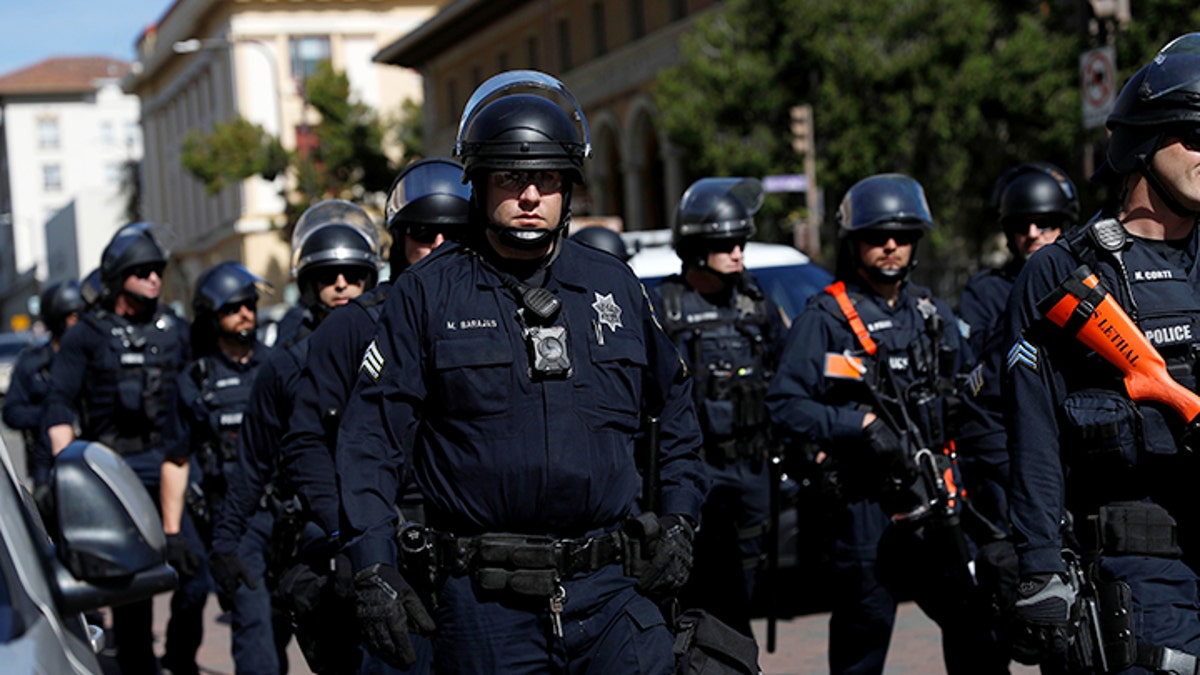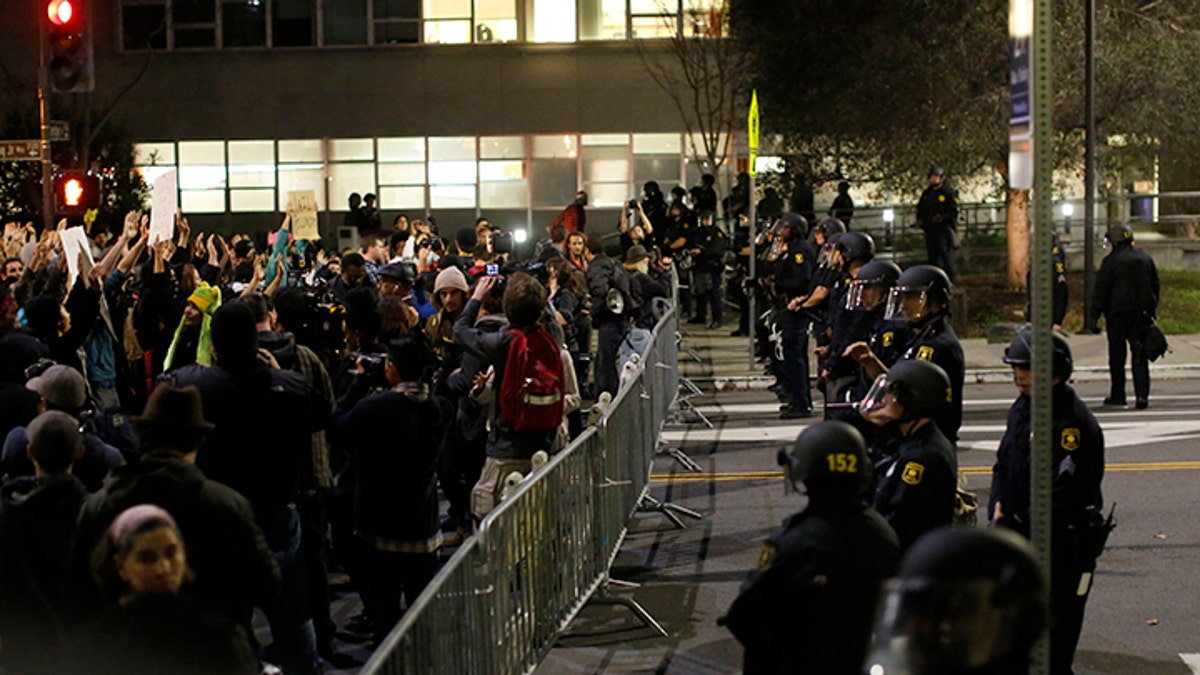
Antifa violence forces Berkeley campus police to rethink their tactics
By , ,
Published September 29, 2017

Police in riot gear standing at the ready as opposing factions gather over the cancellation of conservative commentator Ann Coulter's speech at the University of California, Berkeley, last April. (REUTERS/Stephen Lam)
More than 100 police officers — some garbed in combat helmets and body armor and armed with tear gas launchers — spread out across the University of California, Berkeley’s crowded Sproul Plaza on Wednesday afternoon.
Hailing from the University of California’s own police forces as well as drawing on reserves from the state police, the officers cordoned off an area from nearby protestors after a suspicious package was found in an Amazon store on campus and a bomb threat was declared.
While Berkeley has for decades been a hotbed for activism from all sides of the political spectrum, the recent bomb scares, seemingly daily protests and threats of violence from groups as diverse as Antifa to white nationalists has forced police on this leafy college campus to rethink their tactics totally.
“We can’t turn a blind eye to what happened here, or in the city of Berkeley or any other city across the country for that matter,” Dan Mogulof, a UC Berkeley spokesperson, told Fox News.
The transformation of the UC Berkeley police force from campus cops whose main role was busting underage drinking to a sophisticated anti-riot unit kicked into high gear back in February when an overwhelmed and undersized group of officers had to sit by as more than 100 black-clad Antifa members vandalized university buildings and started fires to prevent conservative provocateur Milo Yiannopoulos from giving a speech on campus.
The event eventually was cancelled and in the aftermath, officials at UC Berkeley did some soul searching to figure out a better way to handle situations like that.
“They did a comprehensive, no sacred-cows review,” Mogulof said of the UC Berkeley police. “They looked at everything with a clear eye in terms of preparations and the pieces they have in place.”
Mogulof admits that the campus police in February were vastly outnumbered by the some 150 Antifa members who came to the school and added that one of the first changes they made was to beef up their presence at protests and other events where the threat of violence looms.
“What’s really changed, and it’s not just one particular group, is the fact we have extreme organizations and individuals in the country right now from all sides of the political spectrum who are ready, willing, and able to come to a college campus and turn it into a literal battleground,” he said.

Protesters chant in front of a police line outside Berkeley Police Department headquarters during a march against the New York City grand jury decision not to indict in the death of Eric Garner, in December 2014. (REUTERS/Stephen Lam)
Besides adding more security at protests and rallies, the UC Berkeley police also amped up their intelligence-sharing with other law enforcement agencies across the nation, changed their barricades from saw horses (which previously had been turned into weapons by protestors) to devices that are not as easily moved and equipped their officers with better crowd-control tools.
Earlier in September, for the first time in two decades, police in Berkeley were armed with pepper spray after the city council modified a 1997 ban at an emergency meeting.
“There are also a number of other tactics that we’ve modified,” Mogulof added. “Things about how we staff, our rules of engagement and other things that I can’t go into for what should be obvious reasons.”
The changes and ramped up security have not come without a cost.
The university earlier this month shelled out $600,000 in security for an on-campus appearance from conservative pundit and former Breitbart Editor Ben Shapiro, and it is estimated that UC Berkeley spent close to $1 million on security ahead of the planned “Free Speech Week” hosted by the conservative Berkeley Patriot group and Yiannopoulos. The event was cancelled at the last minute amid a dearth of speakers and problems with the organizers, but school officials already had called in reserves from police forces from other UC campuses and the state police.
A number of students at UC Berkeley have criticized both the police’s lack of response back in February and the perceived notion that the school is using the police to restrict free speech on campus.
“During the Milo event in February, they made one arrest even though there were over 100 Antifa members on campus causing trouble,” Rudraveer Reddy, a sophomore at UC Berkeley and a member of the Berkeley Patriot, told Fox News. “My friend was there and he was beaten by Antifa and the police did nothing.”
That type of incident, Mogulof said, is exactly what officials at the school are trying to avoid happening again.
Since February the school has continued to be rocked by a number of protests and threats lodged against conservative speakers invited to campus.
In April, controversial conservative writer Ann Coulter cancelled a speech at the school after the Young America’s Foundation pulled its support for the event amid threats of violence. Then in August, a group of around 100 hooded members of Antifa stormed what had been a largely peaceful rally for free speech in the town of Berkeley and attacked at least five people, including the leader of a politically conservative group that had canceled an event a day earlier in San Francisco to avoid potential violence.
Ben Shapiro’s speech in September went off relatively peacefully, although Berkeley police did arrest nine people — three on weapons-related charges. There have been a few arrest in the aftermath of the “Free Speech Week” debacle, but so far nothing on par with the violence seen in February.
“We’re not going to play games when it comes to the safety and wellbeing of our guests and, as well, the campus community,” Mogulof said. “We always approach these events in a content-blind, neutral way. It doesn’t matter to us if it’s been Ben Shapiro or Bernie Sanders talking.”
https://www.foxnews.com/us/antifa-violence-forces-berkeley-campus-police-to-rethink-their-tactics